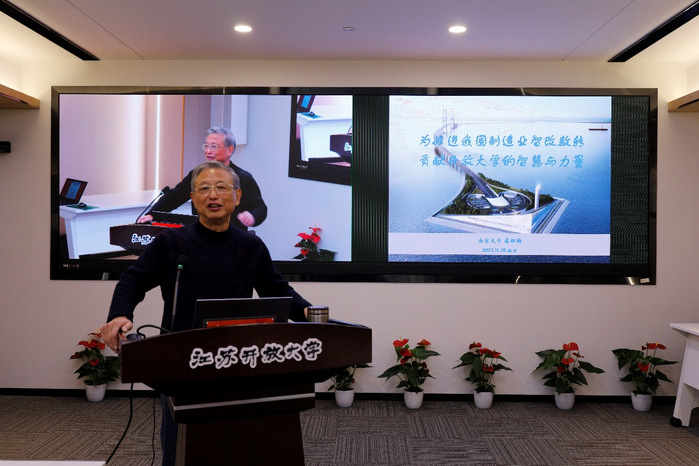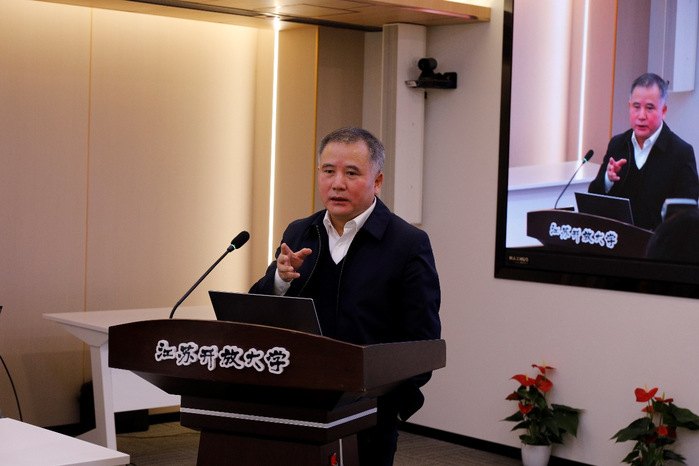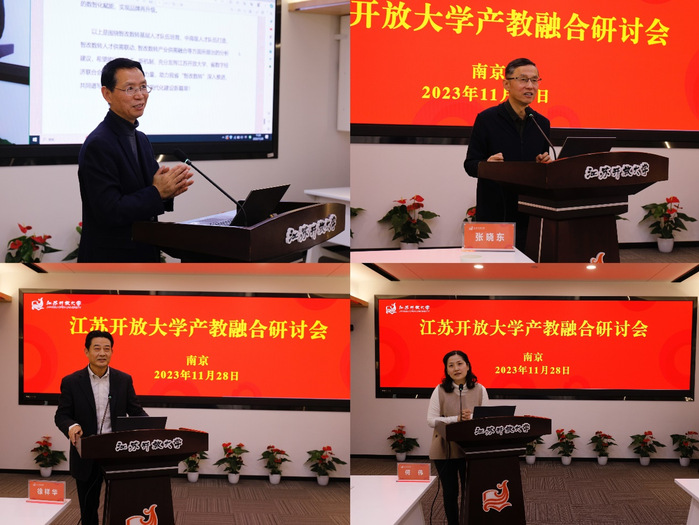On November 28th, JSOU held a seminar on “Intelligent Transformation and Digitalization” for the integration of industry and education. The seminar was hosted by JSOU’s President Ding Rongyu.
Professor Sheng Zhaohan from Nanjing University delivered a keynote speech titled “Contributing the Wisdom and Strength of Open Universities to Advancing the Intelligent Transformation and Digitalization of China's Manufacturing Industry“. He provided an in-depth interpretation of the core concept of intelligent transformation and digitalization, emphasizing the significant role of machine substitution and data-driven decision-making in promoting industrial upgrading and competitiveness. He said, universities should leverage their capabilities, assume historical responsibilities and social obligations in promoting Chinese-style modernization, and establish a comprehensive view of university development. JSOU is embracing opportunities in this new situation. By building a university-level intelligent transformation and digitalization research center, it can construct a specialized think tank and modern service platform to serve Jiangsu Province in promoting intelligent transformation and digitalization. By integrating social resources, it can also enhance its core competitiveness, strengthen its adaptability and synergy with social needs, and create a new picture for its development.
Bu Anxun, vice president of Jiangsu Digital Economy Chamber, said that JSOU should contribute its unique resources and capabilities to the implementation of major initiatives in intelligent transformation and digitalization in Jiangsu Province, continuously innovating practical training mode, talent cultivation mode, talent-enterprise connection mode, and the integration mode of production and demand, thus building a new industrial foundation for intelligent transformation and digitalization.
Zhang Xiaodong, secretary-general of Chinese Management Science Society, reviewed China's industrialization and informatization progress and emphasized the current trend of integrated innovation in digitalization, networking, informatization, and data. He said that researchers in universities and research institutes need to take a forward-looking approach, cultivate interdisciplinary talents through strengthened international cooperation and joint vocational education programs, and serve the strategic needs of intelligent transformation and digitalization.
Xu Xianghua, a member of the Leading Party Members Group of the Standing Committee of Yangzhou Municipal People's Congress, offered four tips to promote the integration of industry and education. Firstly, to focus on the 1650 work mechanism of Jiangsu Province to promote intelligent transformation, digitalization, and networked connections, and collaborate with enterprises to cultivate high-tech talents. Secondly, to work with enterprises to build demonstrative, regional consortia through in-depth cooperation on platform construction. Thirdly, to focus on practical actions and talent cultivation, team up with enterprises to establish practice bases, provide students with internship opportunities, and deliver talents to enterprises. Lastly, to clarify the inherent relationships among teachers, textbooks, teaching methods, and teaching facilities, cooperate with enterprises to create a modern teaching environment.
He Wei, deputy secretary-general of Jiangsu Digital Economy Chamber, said that the current shortage of digital talents has become a hot topic in society. Universities should pay attention to new professions brought about by digitalization and encourage students to tackle problems from the perspective of human-machine collaboration, so as to contribute to the cultivation of digital talents for both application and management.
Ding Rongyu concluded by stating that the sharing of experts was crucial to breaking through mental barriers and better advancing the work of our university. He urged all departments and schools to digest what was presented at the seminar, integrate theory with practice, and strive to achieve more tangible results.



